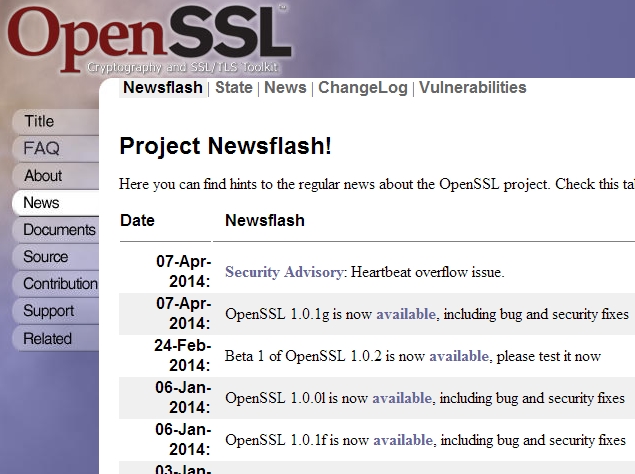- Home
- Internet
- Internet News
- OpenSSL 'Heartbleed' vulnerability lets attackers spy on secure Web traffic
OpenSSL 'Heartbleed' vulnerability lets attackers spy on secure Web traffic
By NDTV Correspondent | Updated: 8 April 2014 15:48 IST

Click Here to Add Gadgets360 As A Trusted Source

Advertisement
A serious flaw in the implementation of OpenSSL, a fundamental security measure used by millions of websites, could expose sensitive information to attackers, including private messages, login credentials and credit card details. The vulnerability, officially tagged CVE-2014-0160 but also known as "Heartbleed", potentially allows attackers to retrieve entire OpenSSL decryption keys from an affected server, allowing them to decrypt secure communications without leaving any sign of brute-force intrusion.
In addition to stealing names, passwords, and message contents, attackers could also disguise themselves as legitimate users, thus eavesdropping and stealing all data flowing in and out of a vulnerable service.
The flaw is not in the encryption method itself, but rather in the way the OpenSSL implementation manages memory. If an attacker sends a deliberately malformed request to the server, it automatically responds with up to 64kB of data that might contain sensitive information.
The problem was known internally and a fix was being prepared, but security firm CloudFlare published information about it before the fix was ready for general release, in an attempt to promote a fix for their own OpenSSL implementation. Web administrators who rely on OpenSSL might not have time to apply the fix before attackers decide to put the flaw into practice.
OpenSSL versions 1.01 and 1.02 beta are affected. Administrators running 1.01f or earlier are advised to upgrade to 1.01g. A 1.02 beta 2 release will fix the vulnerability in the beta channel, when it is released. Security firm Codeomnicon estimates that at least 66 percent of active sites on the Internet could be affected, in addition to a massive number of email, instant message, virtual private network and various other services.
There is no known evidence of a successful attack on any person or organisation due to the Heartbleed vulnerability.
In addition to stealing names, passwords, and message contents, attackers could also disguise themselves as legitimate users, thus eavesdropping and stealing all data flowing in and out of a vulnerable service.
The flaw is not in the encryption method itself, but rather in the way the OpenSSL implementation manages memory. If an attacker sends a deliberately malformed request to the server, it automatically responds with up to 64kB of data that might contain sensitive information.
The problem was known internally and a fix was being prepared, but security firm CloudFlare published information about it before the fix was ready for general release, in an attempt to promote a fix for their own OpenSSL implementation. Web administrators who rely on OpenSSL might not have time to apply the fix before attackers decide to put the flaw into practice.
OpenSSL versions 1.01 and 1.02 beta are affected. Administrators running 1.01f or earlier are advised to upgrade to 1.01g. A 1.02 beta 2 release will fix the vulnerability in the beta channel, when it is released. Security firm Codeomnicon estimates that at least 66 percent of active sites on the Internet could be affected, in addition to a massive number of email, instant message, virtual private network and various other services.
There is no known evidence of a successful attack on any person or organisation due to the Heartbleed vulnerability.
Comments
Catch the latest from the Consumer Electronics Show on Gadgets 360, at our CES 2026 hub.
Related Stories
Popular on Gadgets
- Samsung Galaxy Unpacked 2025
- ChatGPT
- Redmi Note 14 Pro+
- iPhone 16
- Apple Vision Pro
- Oneplus 12
- OnePlus Nord CE 3 Lite 5G
- iPhone 13
- Xiaomi 14 Pro
- Oppo Find N3
- Tecno Spark Go (2023)
- Realme V30
- Best Phones Under 25000
- Samsung Galaxy S24 Series
- Cryptocurrency
- iQoo 12
- Samsung Galaxy S24 Ultra
- Giottus
- Samsung Galaxy Z Flip 5
- Apple 'Scary Fast'
- Housefull 5
- GoPro Hero 12 Black Review
- Invincible Season 2
- JioGlass
- HD Ready TV
- Laptop Under 50000
- Smartwatch Under 10000
- Latest Mobile Phones
- Compare Phones
Latest Gadgets
- Tecno Spark Go 3
- iQOO Z11 Turbo
- OPPO A6c
- Samsung Galaxy A07 5G
- Vivo Y500i
- OnePlus Turbo 6V
- OnePlus Turbo 6
- Itel Zeno 20 Max
- Lenovo Yoga Slim 7x (2025)
- Lenovo Yoga Slim 7a
- Lenovo Idea Tab Plus
- Realme Pad 3
- Garmin Quatix 8 Pro
- NoiseFit Pro 6R
- Haier H5E Series
- Acerpure Nitro Z Series 100-inch QLED TV
- Asus ROG Ally
- Nintendo Switch Lite
- Haier 1.6 Ton 5 Star Inverter Split AC (HSU19G-MZAID5BN-INV)
- Haier 1.6 Ton 5 Star Inverter Split AC (HSU19G-MZAIM5BN-INV)
© Copyright Red Pixels Ventures Limited 2026. All rights reserved.

















